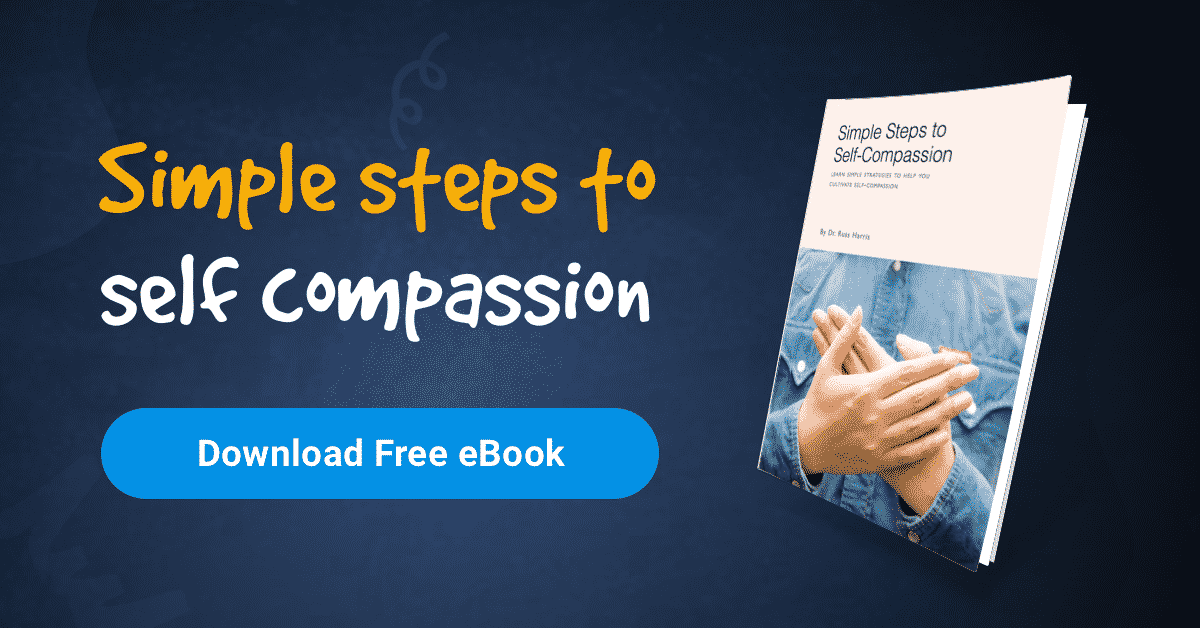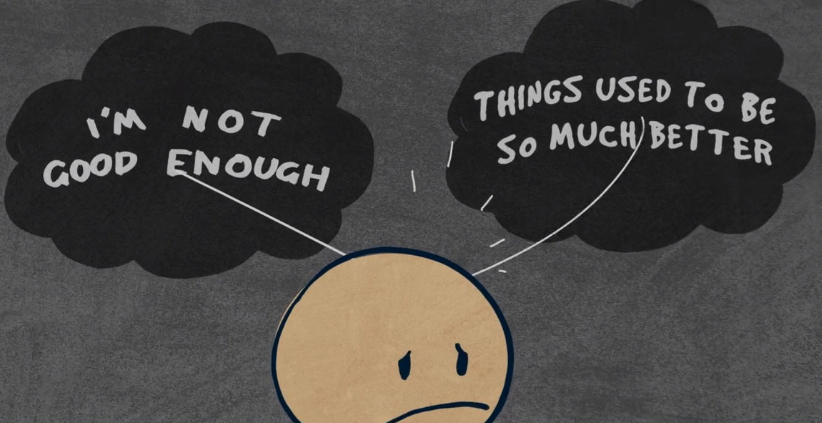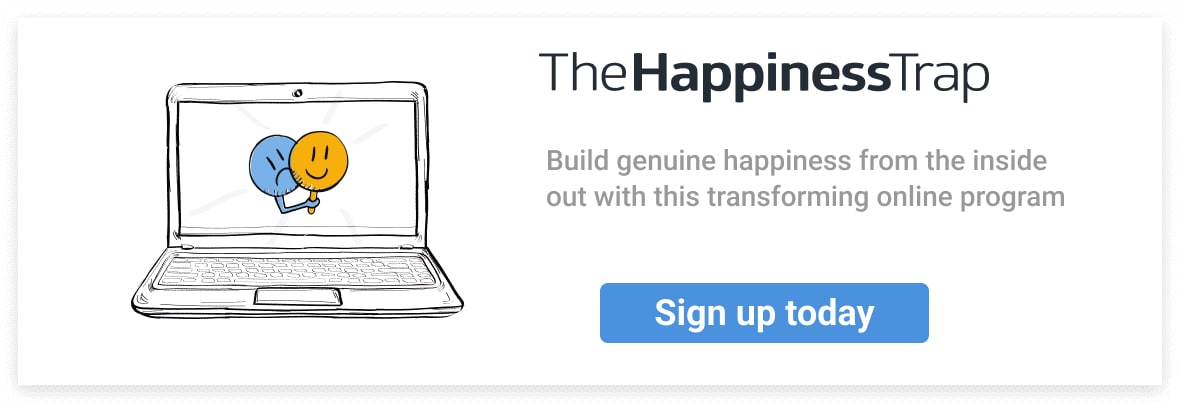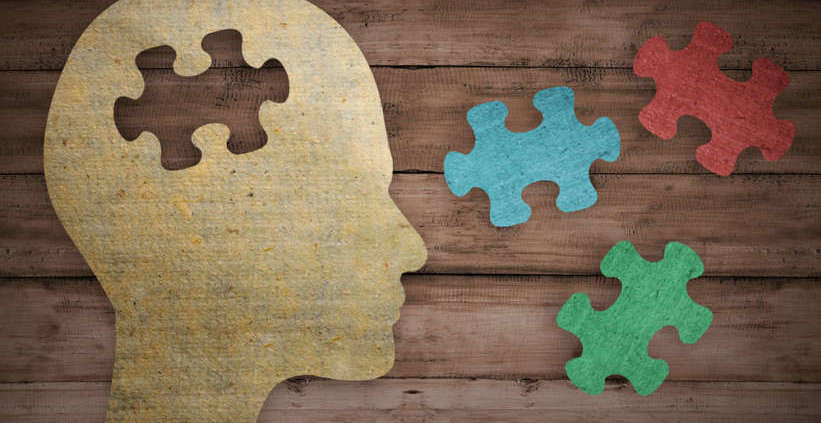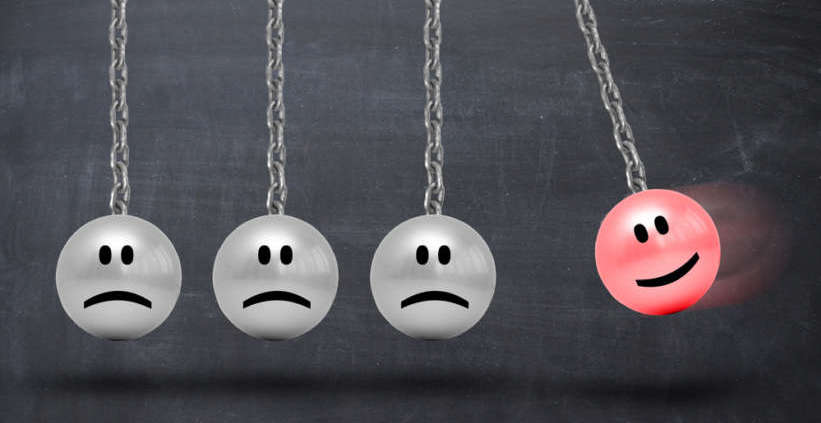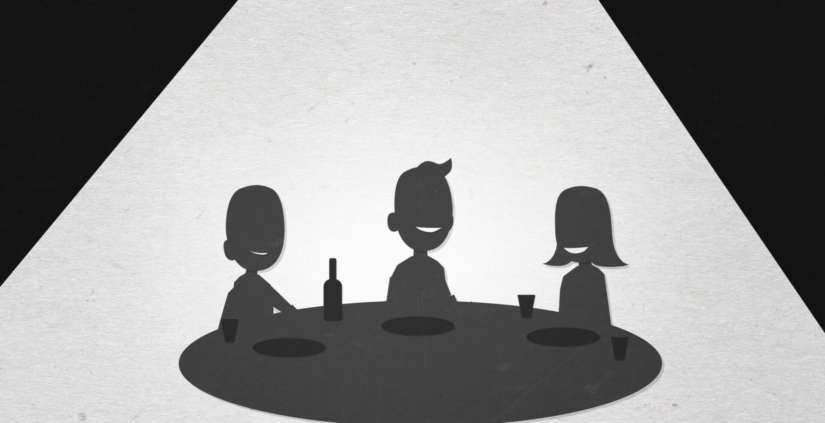

We can think of mindfulness as a psychological toolkit for enhancing your health, wellbeing and life.
- Focus, and refocus, your attention on the task or activity you are doing, and engage in it fully (focusing & engaging skills);
- Detach or unhook from difficult or unhelpful thoughts (unhooking or defusion skills);
- Savour, appreciate and enhance the satisfaction of enjoyable and pleasurable experiences (savouring skills).
Extract from the Happiness Trap, by Dr. Russ Harris
The human mind has given us an enormous advantage as a species. It enables us to make plans, invent things, coordinate actions, analyse problems, share knowledge, learn from our experiences and imagine new futures.
The clothes on your body, the shoes on your feet, the watch on your wrist, the chair beneath you, the roof over your head, the book in your hands — none of these things would exist but for the ingenuity of the human mind.
The mind enables us to shape the world around us and conform it to our wishes, to provide ourselves with warmth, shelter, food, water, protection, sanitation and medicine. Not surprisingly, this amazing ability to control our environment gives us high expectations of control in other arenas as well.
Now, in the material world, control strategies generally work well. If we don’t like something, we figure out how to avoid it or get rid of it, and then we do so. A wolf outside your door? Get rid of it! Throw rocks at it, or spears, or shoot it. Snow, rain or hail?
Well you can’t get rid of those things, but you can avoid them by hiding in a cave, or building a shelter. Dry, arid ground? You can get rid of it by irrigation and fertilisation, or you can avoid it by moving to a better location.
But what about our internal world? I’m talking here about thoughts, memories, emotions, urges, mental images and physical sensations. Can we simply avoid or get rid of the ones we don’t like?
In the outer world, we can do so fairly easily, so shouldn’t it be the same with our inner world? Here’s a little experiment. As you keep reading this paragraph, try not to think about ice cream. Don’t think about the colour or the texture or the taste of it. Don’t think about how it tastes on a hot summer’s day.
Don’t think about how good it feels as it melts inside your mouth. Don’t think about how you have to keep licking around the edges to stop it from dripping on your fingers.
How’d you do?
Exactly! You couldn’t stop thinking about ice cream. Here’s another little experiment. Recall something that happened in the past week. Any memory will do, whether it’s a conversation you had, a movie you watched or a meal you ate. Got one? Good.
Now try to get rid of it. Totally obliterate it from your memory so it can never come back to you, ever again. How did you go? If you think you succeeded, just check again and see if you can still remember it.
Now, tune in to your mouth. Notice how your tongue feels. Run it over your teeth, your gums, your cheeks and the roof of your mouth. Now try to get rid of those sensations. Try to turn your mouth totally numb, as if you just had a shot of novocaine from the dentist. Were you able to forget the sensations?
Now consider this hypothetical scenario for a moment. Suppose someone put a loaded gun to your head and told you that you must not feel afraid; that if you should feel even the slightest trace of anxiety, they will shoot you.
Could you stop yourself feeling anxious in this situation, even though your life depended on it?
(Sure you could try to act calm, but could you truly feel it?)
Okay, one last experiment. Stare at the star below then see if you can stop yourself from thinking for 60 seconds.

That’s all you have to do. For 60 seconds, prevent any thoughts whatsoever from coming into your mind — especially any thoughts about the star!
Hopefully by now you’re getting the point that thoughts, feelings, physical sensations and memories are just not that easy to control. It’s not that you have no control over these things; it’s just that you have much less control than you thought.
Let’s face it, if these things were that easy to control, wouldn’t we all just live in perpetual bliss? Of course, there are a few self-help gurus who claim to live in such a state all the time. Such people often get really rich, their books sell by the million and they attract huge followings of people desperate for ‘the answer’.
My guess is that many readers of this book will have already gone down that path and been sadly disappointed.
Extract from The Happiness Trap, written by Dr. Russ Harris
To answer this question, we need to take a journey back in time. The modern human mind, with its amazing ability to analyse, plan, create and communicate, has largely evolved over the last hundred thousand years, since our species, Homo sapiens, first appeared on the planet.
But our minds did not evolve to make us feel good, so we could tell great jokes, write sonnets and say ‘I love you’.
Our minds evolved to help us survive in a world fraught with danger. Imagine that you’re an early human hunter–gatherer. What are your essential needs in order to survive and reproduce?
There are four of them: food, water, shelter and sex, but none of these things mean much if you’re dead. So the number one priority of the primitive human mind was to look out for anything that might harm you and avoid it!
In essence, the primitive mind was a ‘Don’t get killed’ device, and it proved enormously useful. The better our ancestors became at anticipating and avoiding danger, the longer they lived and the more children they had. With each generation the human mind became increasingly skilled at predicting and avoiding danger.
And now, after a hundred thousand years of evolution, the modern mind is still constantly on the lookout for trouble. It assesses and judges almost everything we encounter: Is this good or bad? Safe or dangerous? Harmful or helpful?
These days, though, it’s not sabre-toothed cats or 200- kilogram wolves that our mind warns us about. Instead it’s losing our job, being rejected, getting a speeding ticket, not being able to pay the bills, embarrassing ourselves in public, upsetting our loved ones, getting cancer, or any of a million and one other common worries.
As a result we spend a lot of time worrying about things that, more often than not, never happen. Another essential for the survival of any early human is to belong to a group. If your clan boots you out, it won’t be long before the wolves find you. So how does the mind protect you from rejection by the group? By comparing you with other members of the clan:
Am I fitting in? Am I doing the right thing? Am I contributing enough? Am I as good as the others? Am I doing anything that might get me rejected?
Sound familiar? Our modern-day minds are continually warning us of rejection and comparing us against the rest of society. No wonder we spend so much energy worrying whether people will like us! No wonder we’re always looking for ways to improve ourselves or putting ourselves down because we don’t ‘measure up’.
A hundred thousand years ago we had only the few members of our immediate clan to compare ourselves with. But these days we can open any newspaper or magazine, switch on any television, tune in to any radio, and instantly find a whole host of people who are smarter, richer, taller, slimmer, sexier, stronger, more powerful, more famous, more successful, or more admired than we are. What’s the fastest way to make a teenage girl depressed?
Show her a fashion magazine. When she compares herself to all those air-brushed, collagen-enhanced, digitally altered supermodels, she is guaranteed to feel inferior or downright unattractive.
And the rest of us are not that different. Thanks to evolution, our minds are now so sophisticated they can even dream up a fantasy of the person we’d like to be — and then compare our ‘real’ self to that impossible standard. What chance have we got? We will always end up feeling not good enough!
Now, for any Stone Age person with ambition, the general rule for success is: the more, the better. The more sophisticated your weapons (and the more of them you have), the more food you can kill. The more plentiful your food stores, the better your chances are for living through times of scarcity. The more substantial your shelter, the safer you are from weather and wild animals.
The more children you have, the better the chance that some of them will survive into adulthood. No surprise then, that our modern mind continually looks for more: more money, more status, more love, more job satisfaction, a newer car, a younger-looking body, a younger-looking partner, a bigger house. And if we succeed, if we actually get more money or a newer car or a better job, then we’re satisfied — for a while. But sooner or later (and usually sooner), we end up wanting more.
Thus, evolution has shaped our minds so that we are almost inevitably destined to suffer psychologically: to compare, evaluateand criticise ourselves; to focus on what we’re lacking; to be dissatisfied with what we have; and to imagine all sorts of frightening scenarios, most of which will never happen.
No wonder humans find it hard to be happy!
It’s amazing how often folks misinterpret the word acceptance.
They may think it means ‘settling’, ‘giving up’, ‘rolling over’, ‘putting up with it’, ‘setting the bar low’, ‘giving up my dreams’, or ‘this is my lot in life so suck it up get on with it’.
Of course, like any word, there are different possible interpretations, but as we use the term in The Happiness Trap Online Program, ‘acceptance’ definitely does NOT mean any of those things.
The Happiness Trap program is based on a model known as ACT, Acceptance and Commitment Therapy, and it strongly encourages an attitude that is the complete opposite of settling or giving up and rolling over.
The C in ACT is for Commitment
ACT encourages you to commit to action to do the things that make life rich full and meaningful. if your life sucks and there’s something you can do about it, TAKE ACTION.
Don’t just ‘settle’ or ‘put up with it’; actively change your behaviour. Do things that are likely to improve the situation.
Do Stuff That Improves Your Quality of Life
- Look after your health
- Build healthy relationships
- Develop or change your career
- Change what you do, in little ways and in big ways, to make your life as good as it can be: spend your time doing meaningful activities.
- Set life-enhancing goals and actively pursue them
‘Acceptance’ as we use the term in ACT and The Happiness Trap, means ‘opening up and making room for difficult thoughts and feelings, and allowing them to flow freely through you in their own good time, neither struggling with them nor getting swept away by them.’
I often use the word ‘expansion’ rather than ‘acceptance’, to prevent such confusion. It’s about expanding: opening up and making room inside you for the inevitable painful feelings that life dishes out to all of us.
If you’re in a bad relationship, bad job, bad neighbourhood, bad country, bad situation of any sort – and if it’s realistic to leave, and it seems likely that leaving will make your life better … then it makes sense to leave.
Acceptance doesn’t mean you passively stay and put up with it if and when leaving is possible and likely to make life better; acceptance means opening up and making room for the difficult thoughts and feelings that are guaranteed to show up whether you choose to stay or whether you choose to leave.
So if life is dull, empty, lacking, unfulfilling, or full of problems and stress, then ACT teaches you:
- How to open up and make room for the difficult thoughts and feelings that are showing up (acceptance) and
- At the same time, take action to improve your life; do things, guided by your values, to solve your problems and make life better.
It’s this double-handed approach that helps us to effectively build a rich and full life.
It’s a lot easier to start some new type of life-enhancing behaviour than it is to keep it going.
How can we sustain new patterns of behaviour, until we’ve done them for so long they become habitual?
And for those of us who are therapists, coaches, or other types of health professionals: how can we help our clients to keep up new behaviour between sessions?
Well, there are hundreds, if not thousands of tools out there to help us with this challenge, but we can pretty much bundle them all into what I like to call ‘The Seven Rs’: Reminders, Records, Rewards, Routines, Relationships, Reflecting, and Restructuring.
Now let’s take a look at each one individually.
1) Reminders
We can create all sorts of simple tools to help remind us of the new behaviour we wish to persist with.
For example, we might create a pop-up or a screen saver on our computer or mobile phone with an important word or phrase or symbol that reminds us to act mindfully or to utilise a particular value.
We might use the old favourite of writing a message on a post-it and sticking it on the fridge or propping it against the bathroom mirror or taping it to the car dashboard. Or we might write something in a diary or calendar or in the ‘notes’ app of a smartphone.
We might write just one word, like ‘breathe’ or ‘pause’ or ‘patience’, or we might use an acronym like ‘A.C.T’ or ‘S.T.O.P’, or a phrase like ‘letting go’ or ‘caring and compassionate’.
Alternatively we might put a brightly-coloured sticker on the strap of our wristwatch or the back of our smartphone or the keyboard of our computer, so that every time we use these devices, the sticker reminds us to do the new behaviour.
2) Records
We can keep a record of our behaviour throughout the day, noting down when and where we do the new behaviour, what the benefits are, when and where we do the old behaviour, and what the costs are.
Any diary or notebook – on paper, or on a computer screen – can serve this purpose.
3) Rewards
When we do some form of new behaviour that involves mindfully acting on our values, hopefully that will be rewarding in its own right. However, we can help to reinforce the new behaviour with additional rewards.
One form of reward is kind, encouraging self-talk, e.g. saying to yourself: ‘Well done. You did it!’ Another form of reward is sharing your success and progress with a loved one who you know will respond positively.
On the other hand, you might prefer more material rewards. For example, if you sustain this new behaviour for a whole week, you buy or do something that you really like – get a massage, for example.
4) Routines
If you get up every morning at the same time to meditate or exercise or do yoga, over time that regular routine will become habitual.
It will require less ‘willpower’ and it will become a part of your regular routine. So experiment: see if you can find some way to build a regular routine or ritual around your new behaviour, so it starts to become part of your way of life.
For example, if you drive home from work, then every night, just before you get out of your car, you might do two minutes of mindful breathing, and reflect on what values you want to live by when you walk through the front door into your home.
5) Relationships
It’s easier to study if you have a ‘study-buddy’, it’s easier to exercise if you have an ‘exercise-buddy’.
In AA programs, they team you up with a sponsor who is there to help you stay sober when the going gets tough. So can you find a kind, caring, encouraging person who can help support you with your new behaviour?
Maybe you can check in with this person on a regular basis and tell them how well you are doing, as mentioned in ‘Rewards’. Or maybe you can email your support person the ‘Records’ you’ve been keeping.
Or maybe you can use the other person as a ‘Reminder’ – ask them to remind you to do the new behaviour, if and when that would be useful. For example, you might say to your partner,
“When you see me worrying, can you please remind me to do some mindful breathing?”
6) Reflecting
Regularly take time to reflect on how you are behaving, and what effect it is having on your life. You can do this via writing it down – ‘Records’ – or in discussion with another person – ‘Relationships’.
Or you can do this as a mental exercise throughout the day, or just before you go to bed, or just as you’re waking up in the morning.
You simply take a few moments to reflect on questions such as:
1) How am I going?
2) What am I doing that’s working?
3) What am I doing that’s not working?
4) What can I do more of, or less of, or differently?
Make sure you also reflect on the times that you STOP doing the new behaviour, and fall back into the old one.
Notice what triggers those relapses and setbacks, and notice what it costs you – i.e. how do you suffer when that happens?
This doesn’t mean beat yourself up! This means non-judgmentally reflecting on the genuine costs to your health and wellbeing caused by falling back into old habits.
Then use your awareness of the suffering this causes you, to help motivate yourself to get back on track.
7) Restructuring
We can often restructure our environment to make our new behaviour easier, and therefore more sustainable.
For example, if the new behaviour is ‘healthy eating’ we can restructure the kitchen to make healthy eating easier.
We can get rid of, or hide away, the junk food, and stock the fridge and pantry with healthy stuff.
If we want to go to the gym in the morning, we could pack up our sports-gear in our gym-bag, and place it by the side of the bed or somewhere else obvious and convenient, so it’s all ready to go as soon as we get up.
So there you have it – ‘The Seven Rs’: Reminders, Records, Rewards, Routines, Relationships, Reflection, and Restructuring.
Now be creative! Mix and match these methods to your heart’s content to create your own set of tools for lasting change. Good luck with it!
Uh-oh! There’s a social event looming. Perhaps it’s a night out with friends, or a wedding, or a family reunion. Or maybe it’s a committee meeting, or an office party; a book club meeting, a networking event, a conference, a business meeting.
Whatever it is, you don’t want to go. Your mind is whirring: Will I enjoy it? Will I know anyone there? Will I say something foolish? Will they like me? Will they think I’m boring? Will I have a bad time?
Maybe you’ve got a knot in your stomach, or sweaty hands, or a racing heart. You’d like to pull out, to make an excuse, to postpone… Oh, what a relief it would be if the event got cancelled!
Ever felt a bit like this? I know I have, many, many, many times in my life. This is an example of what psychologists like to call “social anxiety”. Basically, the term means anxiety or fear related to social interaction with others. And it’s normal. Yup, you heard me right. Social anxiety is NORMAL.
Almost everyone feels anxious in at least some social situations. Yes, even that friend of yours who is always the “life’s blood” of the party, and all those social butterflies and masterful story-tellers and outrageous extroverts who always seem to have something interesting or funny or clever to say. Even they experience social anxiety in some situations.
So why is social anxiety so prevalent? I’m glad you asked. To answer this question, let’s go back in time, right the way back to the stone age (or if you like big words, the “Neolithic era”). You’re a cavewoman or a caveman and the world is a dangerous place.
You’re surrounded by wolves and bears and sabre-toothed tigers. Lots of mean critters outside your cave, only too eager to gobble up a puny two-legged naked ape for lunch.
If you want to survive in this world, you have to belong to a group. If the group kicks you out, you won’t live long by yourself. The wolves will have you for breakfast. And if you survive breakfast, the bears will have you for lunch. You won’t make it to dinner time.
So how does your mind ensure you fit in with the group? It compares you to all the other group members. It asks: Am I measuring up? Am I fitting in? Am I doing the right thing? Am I following the rules? Am I contributing enough? Do they like me? Am I doing anything that might get me rejected?
Does this sound a bit like your mind, at times? If so, join the club. We all have minds that sound a bit like this! We inherited them from our stone age ancestors.
And as a result we are constantly comparing ourselves to other members of the group, and assessing whether we are likely to be rejected.
We’re not consciously aware of it a lot of the time, but it’s continually happening – even in our sleep at times. (Ever had one of those dreams when you’re naked in public and everyone is staring at you? No? Oh – err – maybe that’s just me then!)
The number one myth about social anxiety is that it’s abnormal: everyone else out there just loves social interaction, and there’s something wrong with me for feeling anxious about it. And when we buy into this myth, we can easily beat ourselves up:
“What’s wrong with me?”, “Why am I like this?”, “I shouldn’t feel anxious”, “I’m being silly”, “I’m defective” etc.
And of course, this self-flagellation (I feel smart when I use big words like that) doesn’t help; we’re just piling harsh self-criticism on top of our social anxiety – which is likely to make it even worse!
Of course, some people’s lives are much more affected by social anxiety than others. Research shows around 50% of the population find that social anxiety has a significant negative impact on their life, and around 12% of the population are so badly affected by it, they meet criteria for a diagnosis of “social anxiety disorder”.
So in my next blog, we’ll look at why social anxiety affects some people so much more than others, and what makes it worse, and what makes it better. But for now, I want to leave you with one practical tip to help you deal with it. (There are many more practical tips to follow in my next few blogs on this topic; I just want you to experiment with this one for now).
Tip #1 for Social Anxiety: Acknowledge it’s normal
When you’re feeling social anxiety, take a moment to acknowledge it. With a kind inner voice, tell yourself: “This is normal, everyone feels this at times.”
This won’t get rid of your anxiety, of course; but it’s a whole lot better than beating yourself up for having a perfectly normal and commonplace human experience.
“I didn’t say that!”
“Yes, you did!”
“No, I didn’t. What I said was…”
“No! You said…”
Have you ever had an argument along these lines? Of course you have. Everyone has. And isn’t it almost always a complete waste of time?
The problem is, human memory is fallible. We all like to believe our memory is accurate, but the inconvenient truth is, it’s often unreliable. Need some proof? Watch a DVD of a great movie and as soon as you’re finished, pick your favorite scene (that includes dialogue), and see how accurately you can recall the words spoken.
Write down what you think they said, then watch again and see how much you got right. If you can recall even one line accurately, you’re doing well. (And if you do manage to recall one line, it’s bound to be one you’ve heard often, such as, “I’ve got a bad feeling about this”.)
The problem is, not only is our memory fallible, but also we do not, generally, listen well to others – especially when we are stressed or tense or upset. And even if we do hear clearly, when we are upset or stressed, we often misinterpret what we hear. We will frequently interpret it in a more negative way than when we are in a good mood.
Now, even if we accept all this as true, when we are cool, calm and collected, we are likely to forget it during an argument. Instead, we get hooked by the, “I’m right, you’re wrong!” story. And once it hooks us, the argument will go on and on and on pointlessly. I mean these arguments never end well, do they?
The other person never says, “Oh, you’re right. Actually, now I remember. I did say that! I’m so sorry!”
So how can we end these pointless arguments? One simple strategy is to say, “We both remember this differently and we’ll never convince each other the other is right, so what can we do now, to make things right?”

